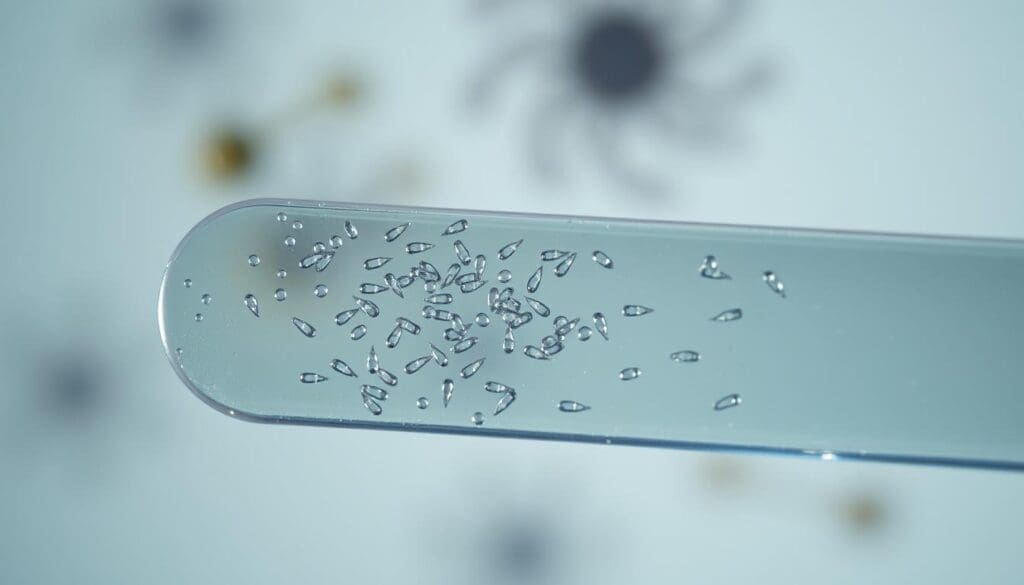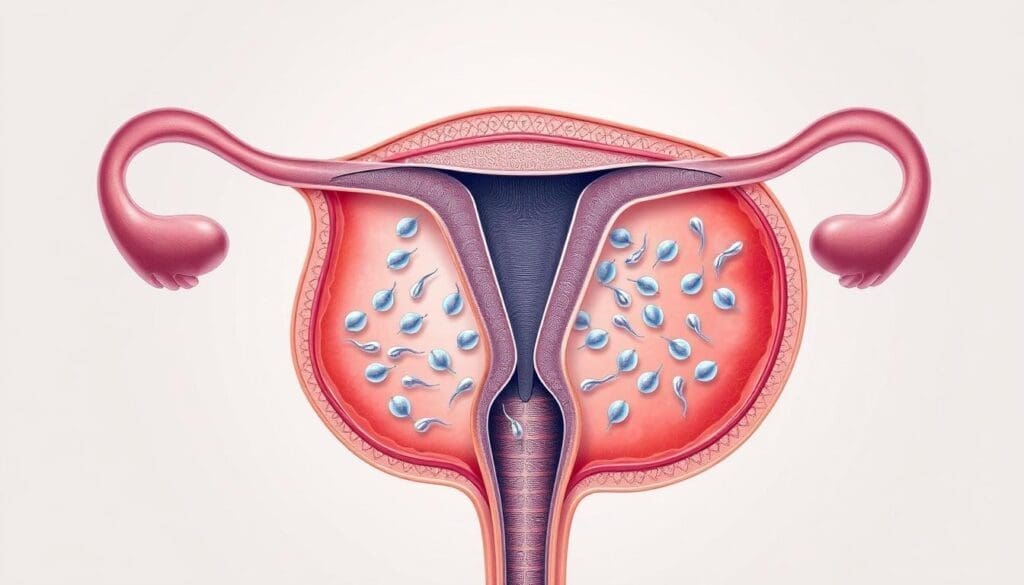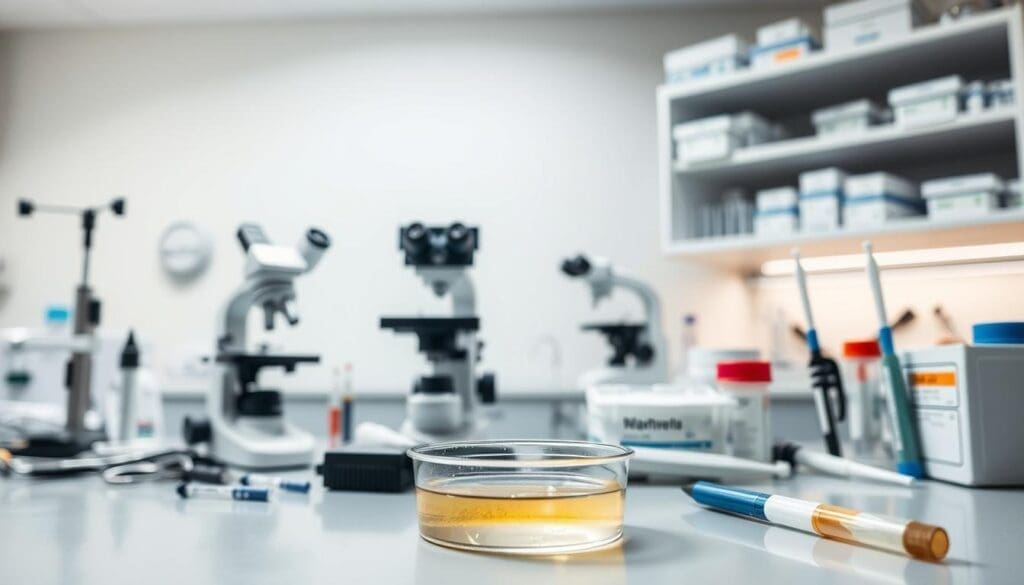Last Updated on November 25, 2025 by Ugurkan Demir

Dealing with low sperm count can be tough for men who want to have children. The good news is that with the right guidance and care, you can increase sperm count naturally and improve fertility.
If you’re wondering where can I get a sperm count test done, many advanced medical centers like Liv Hospital offer comprehensive fertility assessments and personalized treatment plans.
Recent studies show that nearly half of infertility cases are due to male factors, with low sperm count being one of the main causes. Thankfully, modern reproductive medicine provides effective solutions, and many men can still achieve pregnancy with proper treatment and lifestyle changes.
At Liv Hospital, our specialists focus on personalized care to help you overcome fertility challenges. In this article, we’ll share expert tips on getting pregnant with low sperm count and natural ways to improve sperm health.

For couples trying to conceive, knowing about male fertility and sperm count is key. Male fertility is complex, with sperm count being a big part of it.
A normal sperm count is at least 15 million per milliliter of semen. If it’s less, it’s called low sperm count or oligospermia. Low sperm count makes it harder to get pregnant.
The World Health Organization (WHO) says a count under 15 million per milliliter lowers chances of pregnancy. The WHO’s criteria for sperm count have changed over time, showing a better understanding of male fertility.
“A man’s fertility is not just about the number of sperm; it’s also about the quality and motility of those sperm.” – Medical Expert, Fertility Specialist
Many people don’t know how common male fertility issues are. Studies show nearly half of all infertility cases involve male factors. This can be due to low sperm count, poor motility, or abnormal shape.
| Cause of Infertility | Percentage |
| Male Factors | 40-50% |
| Female Factors | 30-40% |
| Combined Factors | 10-20% |
| Unexplained | 10% |
Sperm count is very important for male fertility. Even with a lower count, it’s possible to conceive, but the chances are lower. A healthy sperm count boosts the chance of successful fertilization. Lifestyle, environment, and health can affect sperm count.
Understanding what affects male fertility and sperm count helps couples improve their chances of getting pregnant. A healthy lifestyle, avoiding too much heat, and managing stress are key steps.

Men worried about their fertility should know where to get sperm count tests. These tests are easy to get, with many places to choose from.
Fertility clinics focus on reproductive health. They offer detailed sperm count tests. Their facilities are top-notch, and staff are very knowledgeable.
At a fertility clinic, you can expect:
Hospital labs are also great for sperm count tests. Many have andrology or urology departments for semen analysis.
“Hospital labs provide accurate and reliable test results, often with quicker turnaround times compared to other options.” – Medical Expert, Urologist
Using hospital labs has many benefits:
| Service | Benefit |
| Quick Turnaround Time | Results available within a few hours or days |
| Accurate Diagnosis | Advanced equipment ensures precise analysis |
| Expert Care | Staffed by experienced laboratory professionals |
At-home testing kits are perfect for convenience. They let you collect a sample at home and send it for analysis.
Key features of at-home testing kits include:
In conclusion, there are many ways to get a sperm count test. You can choose from fertility clinics, hospital labs, or at-home kits. Each has its own benefits, depending on what you need and prefer.
Understanding your sperm test results is key to knowing your fertility. When you get your report, it might seem hard to understand. But, by focusing on a few important points, you can get a clear picture of your sperm’s health.
Three main factors are important when looking at your sperm test results: count, motility, and morphology. These help show if your sperm can fertilize an egg.
Fertility experts say, “A normal sperm analysis result means you have a healthy count, motility, and morphology” (
“A healthy sperm count, good motility, and normal shape increase your chances of successful fertilization.”
Your sperm analysis report will give you detailed info on these parameters. It’s important to talk about your report with a healthcare professional to understand what it means.
When looking at your report, check for:
If your sperm test shows any problems or if you’re having trouble getting pregnant, see a fertility specialist. They can guide you on what to do next and suggest more tests or treatments if needed.
“Don’t hesitate to see a fertility specialist if you’re worried about your sperm health or if you’re having trouble getting pregnant.”
By understanding your sperm test results and getting medical advice, you can take steps to address any fertility concerns.
Making changes to your diet can greatly improve sperm health. A diet full of essential nutrients and antioxidants can boost sperm quality and count.
Antioxidants are key in protecting sperm from damage. They help fight oxidative stress, which can harm DNA and fertility. Here are some antioxidant-rich foods:
Some nutrients are critical for sperm development. These include:
Eating a balanced diet is key for male fertility. It should include fruits, vegetables, whole grains, and lean proteins. Also, remember to:
Regular physical activity is key for better sperm count and fertility. Exercise boosts sperm production, motility, and shape. A balanced exercise routine can help improve fertility.
Various exercises affect sperm health differently. Aerobic exercises like brisk walking, cycling, and swimming boost heart health. This can increase sperm count and motility.
Resistance training also helps by balancing hormones, including testosterone. This is vital for sperm production.
Yoga and meditation reduce stress, which harms sperm count. Lower stress levels are needed for better sperm production.
Finding the right exercise balance is critical. Overexertion can increase oxidative stress and harm sperm. Moderate exercise improves sperm quality without stressing the body too much.
We suggest a routine with aerobic, resistance, and flexibility exercises. This mix supports overall health and fertility.
Some exercises can harm sperm count and should be avoided when trying to conceive. High-intensity cycling raises scrotal temperature, potentially harming sperm. It’s best to avoid it.
Also, avoid exercises that stress the groin area too much. Listen to your body and adjust your routine to protect fertility.
Too much heat can harm sperm health. The testicles are meant to be cooler than the rest of the body. This coolness is key for making healthy sperm. When they get too hot, sperm production and function can suffer.
Heat stress can lower sperm count and quality. High temperatures can also damage sperm DNA. This makes it harder to get pregnant.
Many daily activities and things around us can raise testicular temperature. Some common causes include:
There are easy ways to lower heat and protect sperm:
| Cooling Strategy | Description | Benefits |
| Wear loose, breathable clothing | Choose underwear and pants that allow for good airflow | Reduces testicular temperature |
| Avoid hot environments | Limit time spent in saunas, hot tubs, and very hot workplaces | Minimizes heat stress on sperm |
| Take regular breaks | If working in a hot environment, take breaks in cooler areas | Helps maintain a healthy testicular temperature |
By watching out for heat and using these cooling tips, men can keep their sperm healthy. This might even boost their chances of getting pregnant.
Changing your diet and exercising are just the start. Many lifestyle changes can also boost sperm count. These changes are easy to make and good for your health.
Stress can lower testosterone levels, which is bad for sperm. Effective stress management techniques like meditation and yoga can help. Adding these to your daily life might improve your sperm count and fertility.
Being at a healthy weight is key for good sperm. Being overweight can lower sperm count and make them move less. Eating right and exercising can help keep your sperm healthy.
Smoking and drinking too much alcohol harm sperm. Quitting smoking can greatly improve sperm health. Limiting alcohol helps keep sperm production and testosterone levels up.
Good sleep helps regulate hormones, including testosterone, which is important for sperm. Getting enough sleep and rest supports sperm health and fertility. Try for 7-8 hours of sleep each night and take breaks to relax.
By making these lifestyle changes, men can improve their sperm count and fertility. It’s about making lasting changes that boost your health and well-being.
To boost fertility, we’ll look at special supplements, avoiding toxins, and timing for conception. We’ll cover how supplements, avoiding toxins, and timing can help you conceive.
Some supplements help with fertility by improving sperm quality. Key supplements include:
Always talk to a healthcare provider before starting supplements. This ensures they’re safe for you.
Toxins can harm sperm quality and fertility. Common toxins to avoid include:
To reduce exposure, use non-toxic cleaners, choose organic foods, and avoid heating food in plastic.
Timing intercourse with ovulation boosts conception chances. To optimize timing:
By syncing intimacy with ovulation, couples can greatly increase their conception chances.
Getting pregnant with low sperm count is tough, but it’s doable. The right steps and support can really help couples. They can boost their chances of having a baby.
We’ve shared 10 ways to naturally increase sperm count. This includes better diet, exercise, avoiding heat, and managing stress. Men can also try fertility supplements to improve their sperm health.
New medical advancements help couples with low sperm count. Understanding why it happens and getting medical help is key. This way, they can find treatments to help them conceive.
Low sperm count doesn’t mean couples can’t get pregnant. By following our tips and getting medical advice, they can increase their chances. This way, they can have a successful pregnancy.
We suggest couples talk to doctors to find the best plan for them. With the right help and strategies, they can overcome low sperm count challenges. Getting pregnant is possible.
Yes, getting pregnant with low sperm count is possible. It might be harder, but with the right steps, couples can conceive.
To naturally boost sperm count, try dietary changes and regular exercise. Also, manage stress and avoid too much heat.
Eat foods full of antioxidants like fruits, veggies, and nuts. Also, choose foods rich in zinc, vitamin D, and omega-3s for better sperm health.
Exercise boosts sperm count and fertility. It improves heart health, reduces stress, and keeps weight in check.
Yes, too much heat harms sperm production. Stay away from saunas and wear loose clothes to protect your sperm.
Some supplements, like antioxidants, might help. But talk to a doctor before taking any new supplements.
Toxins like pesticides and heavy metals can hurt sperm health. Avoiding them helps protect your fertility.
Timing sex with ovulation boosts conception chances. Knowing the female partner’s cycle and ovulation is key for planning a family.
Yes, healthy habits like a balanced diet, exercise, stress management, and avoiding harmful substances can improve sperm count.
Improving low sperm count needs a mix of diet, lifestyle changes, and sometimes medical help. A doctor can offer tailored advice.
Some low sperm counts can be treated medically. But many men can naturally improve their count with the right lifestyle changes.
National Center for Biotechnology Information. (2025). 10 Tips to Increase Sperm Count Naturally. Retrieved from https://www.ncbi.nlm.nih.gov/pmc/articles/PMC5203687/
Subscribe to our e-newsletter to stay informed about the latest innovations in the world of health and exclusive offers!